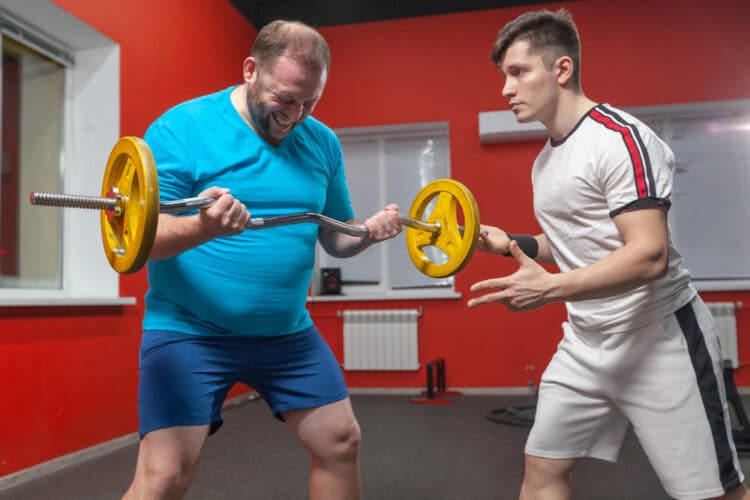
Walking into a gym for the first time can feel overwhelming. Bright lights, unfamiliar machines, and a sea of people moving with confidence can make anyone second-guess their place in that space.
That feeling intensifies for someone carrying extra weight. Equipment may not feel comfortable, past struggles with exercise may create hesitation, and the thought of keeping up with others can feel discouraging. A personal trainer for obese clients can step in with the right mix of knowledge, patience, and encouragement.
At NPTI Florida, we focus on turning the training floor into a welcoming environment where success feels possible. We help clients change the focus from frustration to empowerment through practical, sustainable strategies, one session at a time.
The Role of a Personal Trainer for Obese Clients
A personal trainer for obese clients must first create an environment that feels safe. Clients who feel embarrassed or nervous are less likely to commit to long-term change. Focus on compassion, encouragement, and sensitivity to their limits. Building rapport early helps clients trust us, share their challenges openly, and commit to the process.
Our responsibility also extends to safety. Always assess health conditions, understand equipment limitations, and adapt sessions to reduce risk. For example, floor exercises may feel uncomfortable or unsafe for someone who struggles to get up and down. Instead, you can introduce standing or seated variations that achieve the same results without added stress.
Creating this foundation makes it possible for clients to progress at their own pace, which leads to better results and higher motivation. The more comfortable and supported clients feel, the more effort they bring to each session.
Building Strength for Lasting Change
Strength training offers obese clients one of the most potent tools for transformation. Muscle mass boosts metabolism, making it easier to burn calories throughout the day. It also provides stability for joints, reduces injury risk, and supports functional movement.
Weightlifting may be unfamiliar to many obese clients. Begin with simple, controlled movements that emphasize form. Resistance bands, light dumbbells, or body weight exercises help build confidence without overwhelming the client. Instead of chasing heavy loads, focus on movement quality by teaching clients how to feel the muscle engagement and complete each rep safely.
As strength improves, clients often notice daily tasks becoming easier. Standing from a chair, climbing stairs, or carrying groceries no longer feels as difficult. These victories reinforce the value of strength training and encourage consistency.
Cardio Progressions that Support Health
Cardiovascular training helps reduce fat, improve heart health, and increase endurance. However, obese clients cannot always tolerate high-impact movements. Jumping, sprinting, or high-intensity intervals often place too much stress on joints and lungs.
Choose low-impact options that are accessible yet effective. Walking is often the starting point because it can be done anywhere, requires no equipment, and allows us to track progress easily. Swimming, cycling, or using an elliptical also offers great options for building endurance without strain.
Start small, short sessions at low intensity, and increase time or speed gradually. Clients learn that sustainable progress matters more than extreme effort. Even a consistent 20-minute walk can create health improvements when performed regularly. Over time, you can layer in more variety to keep cardio interesting and challenging.
Improving Mobility and Functional Strength
Mobility is often limited in obese clients. Tight muscles, reduced range of motion, and joint discomfort make many traditional exercises impractical. This is why functional training plays such an important role.
Incorporate movements that mirror daily activities. Sit-to-stand variations improve independence, step-ups improve stability, and carrying exercises build core strength. Modifications allow clients to participate without embarrassment. For example, a modified squat using a bench offers the same benefits as a full squat but feels more approachable.
Stretching also has a place, but it must be targeted. Gentle hamstring stretches, hip openers, and shoulder mobility drills reduce stiffness without pushing into unsafe ranges. Over time, these drills improve mobility, so exercise feels better and daily life feels easier.
The Mind-Body Connection and Motivation
Training obese clients also requires awareness of the emotional side of fitness. Many clients arrive with low self-esteem or a belief that they will fail. Others carry pressure from unrealistic weight loss goals, like dropping 50 pounds in six months.
Reframe those goals into achievable milestones. Instead of focusing on a number on the scale, you can highlight improvements in strength, stamina, and mobility. Also, remember to celebrate non-scale victories, such as reduced knee pain, more energy, or the ability to complete exercises that once felt impossible.
Maintaining motivation also means keeping communication open. Check in between sessions, acknowledge progress, and remind clients of their wins. That ongoing support helps clients feel accountable and connected to the process. It also keeps them engaged when setbacks occur, which is common in long-term weight loss journeys.
Education and Specialization for Trainers
Helping obese clients reach their goals requires specific knowledge. Trainers who specialize in obesity and weight management are better prepared to create safe, effective programs. Education expands our ability to modify exercises, understand medical concerns, and offer guidance with confidence.
At NPTI Florida, our personal fitness training diploma program provides 600 hours of hands-on education that prepares trainers for real-world challenges. Those ready to expand their expertise can continue with advanced personal fitness training, which focuses on extended knowledge of performance, corrective exercise, and program design.
Are you a trainer who wants to work with specific populations? Our personal training specialist program equips you to support clients dealing with unique conditions, including obesity.
Helping Clients Transform Safely
At NPTI Florida, we prepare trainers to approach these challenges with expertise and compassion. As a licensed and accredited, veteran-owned, and military-trusted school, our team offers the education and hands-on practice future trainers need to make a lasting impact.
Helping obese clients reach their goals takes compassion, creativity, and a commitment to seeing potential where others have only seen limits. That mindset is what we teach every day, and it is how our graduates change lives for the better. Get in touch with us today to find out more.

